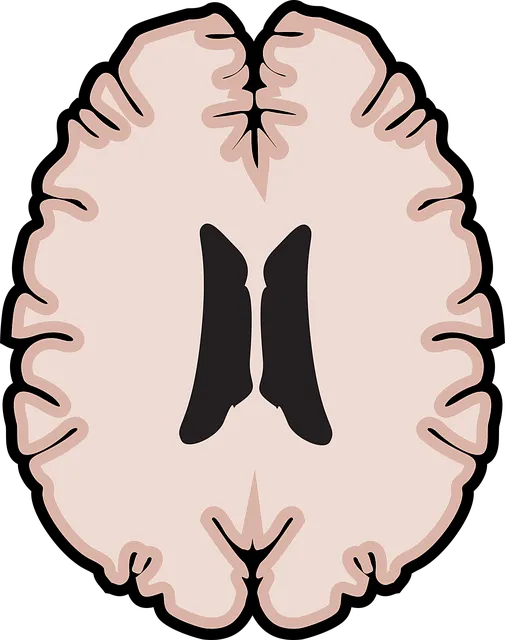Mental health professionals at Broomfield Kaiser Permanente's psychiatry department prioritize risk management through tailored strategies accessible via their dedicated phone line. They integrate compassion cultivation and "mind over matter" principles to foster a supportive environment addressing patient symptoms and promoting overall well-being. This holistic approach, reflected in services and professional development, commits to excellence in mental health care. By incorporating mindfulness, stress management, and cultural competency training, they enhance coping mechanisms and resilience against burnout. Proactive risk management strategies, like Mental Wellness Journaling Exercises, maintain safety and care quality, particularly for diverse patient populations. Technology, including secure messaging and telemedicine, transforms risk management, enabling continuous assessment and the development of wellness coaching programs.
Mental health professionals face unique challenges, necessitating robust risk management planning. This article guides you through essential aspects of managing risks in psychiatric practice. From understanding the fundamental principles of risk management in mental health to identifying specific hazards faced by psychiatrists, we offer practical insights. We explore developing comprehensive plans, implementing risk mitigation strategies, and leveraging technology for efficient monitoring and communication, including the Broomfield Kaiser Permanente psychiatry phone number as a useful resource.
- Understanding Risk Management in Mental Health Practice
- Identifying Potential Risks and Hazards for Psychiatrists
- Developing a Comprehensive Risk Management Plan
- Implementing Strategies to Mitigate Risks
- The Role of Technology: Tools for Effective Risk Monitoring and Communication (Including Broomfield Kaiser Permanente Psychiatry Phone Number)
Understanding Risk Management in Mental Health Practice

Mental health professionals constantly navigate complex emotional landscapes, making risk management an integral part of their practice. It involves anticipating and mitigating potential risks to ensure safe and effective patient care. This proactive approach is essential in creating a supportive environment for both clients and practitioners, fostering mental wellness. By integrating compassion cultivation practices into daily routines, professionals can enhance their ability to manage challenging situations, cultivating a culture of resilience within their practices.
At Broomfield Kaiser Permanente’s psychiatry department, accessible through the provided phone number, risk management strategies are tailored to meet individual patient needs. The team embraces mind over matter principles, encouraging clients to reframe thoughts and challenges as opportunities for growth. This holistic approach ensures that mental health services not only address symptoms but also promote overall well-being, reflecting a commitment to excellence in patient care and professional development.
Identifying Potential Risks and Hazards for Psychiatrists

Mental health professionals, such as psychiatrists at Broomfield Kaiser Permanente (search their psychiatry phone number for appointments), face unique challenges that can lead to various risks and hazards. One of the primary concerns is burnout due to the high workload and emotional demands of their practice. Long working hours, heavy caseloads, and complex patient needs can contribute to stress and fatigue, making it essential for psychiatrists to prioritize self-care and resilience-building strategies.
Additionally, cultural competency within healthcare is a significant aspect that requires constant attention. Psychiatrists must navigate diverse patient backgrounds, cultures, and beliefs, ensuring they provide culturally sensitive care. Training in this area, such as through the Healthcare Provider Cultural Competency Training, can help mitigate potential risks related to miscommunication or insensitive treatment. Other practices like Mindfulness Meditation and Stress Management Workshops within organizations can empower psychiatrists to enhance their coping mechanisms and overall well-being.
Developing a Comprehensive Risk Management Plan

Developing a Comprehensive Risk Management Plan is an integral part of ensuring effective care and safety in mental health practice, especially when considering the sensitive nature of patient interactions. For professionals at Broomfield Kaiser Permanente’s psychiatry department, accessible through the psychiatric phone number, this involves crafting strategies to navigate complex scenarios with cultural sensitivity in mental healthcare practice. By integrating Mental Wellness Journaling Exercises into their risk management planning, professionals can proactively identify and mitigate potential risks while fostering an environment of support and understanding for diverse patient populations.
This proactive approach extends beyond individual cases, contributing to the overall improvement of Risk Management Planning for Mental Health Professionals. It encourages a culture where mental health care is tailored to meet individual needs, promoting positive mental wellness outcomes. Through regular review and adaptation, these plans become living documents, reflecting the evolving landscape of mental healthcare while ensuring patient safety remains paramount.
Implementing Strategies to Mitigate Risks

Implementing effective risk management strategies is paramount for mental health professionals to ensure a safe and supportive environment for their clients. At Broomfield Kaiser Permanente, the psychiatry phone number serves as a vital resource, offering guidance and support for both patients and practitioners. By integrating various techniques, such as regular staff training on risk assessment and crisis intervention, healthcare providers can proactively identify and mitigate potential hazards.
Mindfulness Meditation has emerged as a powerful tool within this context. Incorporating practices like this into daily routines can enhance emotional resilience among professionals, thereby reducing their own stress levels and improving overall mental wellness. Additionally, the development of Mental Wellness Podcast Series Production or engaging in Mental Wellness Coaching Programs can further equip practitioners with resources to support both their personal well-being and effective client care.
The Role of Technology: Tools for Effective Risk Monitoring and Communication (Including Broomfield Kaiser Permanente Psychiatry Phone Number)

Technology plays a pivotal role in modern risk management for mental health professionals. Advanced tools enable efficient monitoring and communication, enhancing patient safety. From secure messaging platforms to telemedicine solutions, these innovations facilitate continuous assessment and prompt intervention. For instance, the Broomfield Kaiser Permanente psychiatry phone number offers a direct line of support, allowing professionals to connect with experts quickly during crises.
Emotional Intelligence and Mind Over Matter principles can be integrated into technology-driven systems, promoting mental wellness coaching programs development. These tools not only assist in risk assessment but also provide resources for patients to manage their emotional well-being. By leveraging technology effectively, mental health professionals can create a more supportive and proactive environment, ultimately contributing to improved patient outcomes.
Mental health professionals face unique challenges that require proactive risk management. By understanding the potential risks, from patient safety to burnout, and implementing a well-structured plan, psychiatrists can create a safer, more supportive practice environment. A comprehensive strategy involves identifying specific hazards, utilizing technology for efficient monitoring, and establishing clear communication channels, such as the Broomfield Kaiser Permanente psychiatry phone number, to ensure prompt intervention and patient care. Regularly reviewing and updating this plan is essential to adapt to evolving challenges in mental health care.





